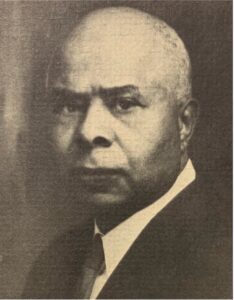By Dannie Gore

Courtesy of Tuskegee Institute Archives
Like his contemporaries W.E.B. Dubois and Booker T. Washington, Monroe Nathan Work (1866-1945) devoted his life to improving the status of black Americans. Unlike DuBois and Washington, however, Work was a quiet crusader, a painstaking and diligent scholar who believed that he could do more to help the black cause by the accumulation and dissemination of information about the black experience than by political grandstanding. Not surprisingly, Work’s accomplishments were under appreciated during his lifetime and are almost completely ignored today.
Born to former slaves in North Carolina, Work moved with his family to Illinois at an early age. Desiring a career as a minister, he attended the Chicago Theology Seminary but was soon drawn to the study of sociology at the University of Chicago, where he earned his master’s degree. In 1903, he accepted a teaching position at the Georgia State Industrial College in Savannah. At the same time, Work became a disciple of W.E.B. DuBois’ Atlanta University Publications and collaborating with him on numerous other projects. Work was one of the initial members of DuBois’ Niagara Movement, a radical group organized to counter the accommodationist tendencies of Booker T. Washington.
The failure of political protest in Savannah, however, Disillusioned Work, and in 1908 he joined Washington at Tuskegee Institute, where he remained for thirty years as head of the Department of Records and Research. He devoted most of his time there to gathering information that illuminated the black condition and refuted erroneous stereotypes, compiling along the way some seventy articles and producing the very important Negro Tear Book and A Bibliography of the Negro in Africa and America.Work was also a leader in the anti lunching crusade and one of the first scholars to study the African origins of black American culture.
Although Monroe Nathan Work and others like him never received the same recognition for their accomplishments as did other more visible black leaders, their quiet crusades were of immeasurable importance laying the foundations for the modern civil rights movement.

© Copyright 2022 - The New 3Rs | Privacy Policy | Terms of Use